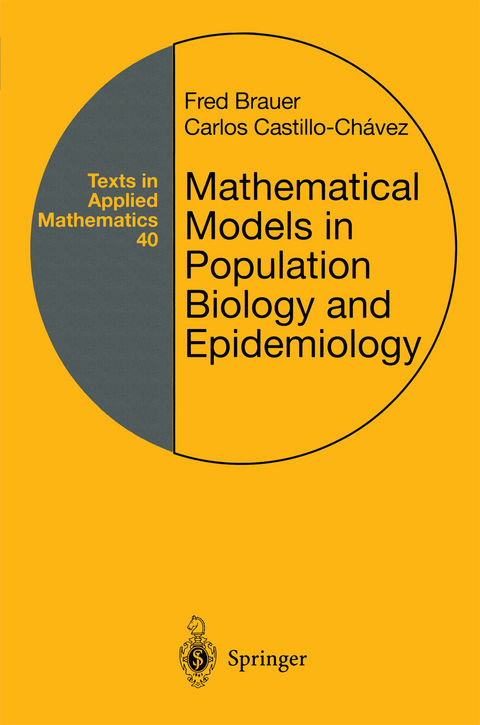
Mathematical Models in Population Biology and Epidemiology
Seiten
2010
|
Softcover reprint of hardcover 1st ed. 2001
Springer-Verlag New York Inc.
978-1-4419-3182-5 (ISBN)
Springer-Verlag New York Inc.
978-1-4419-3182-5 (ISBN)
As the world population exceeds the six billion mark, questions of population explosion, of how many people the earth can support and under which conditions, become pressing. Single population models are, in some sense, the building blocks of more realistic models - the subject of Part II.
As the world population exceeds the six billion mark, questions of population explosion, of how many people the earth can support and under which conditions, become pressing. Some of the questions and challenges raised can be addressed through the use of mathemathical models, but not all. The goal of this book is to search for a balance between simple and analyzable models and unsolvable models which are capable of addressing important questions such as these. Part I focusses on single-species simple models including those which have been used to predict the growth of human and animal population in the past. Single population models are, in some sense, the building blocks of more realistic models - the subject of Part II. Their role is fundamental to the study of ecological and demographic processes including the role of population structure and spatial heterogeneity - the subject of Part III. This book, which includes both examples and exercises, will be useful to practitioners, graduate students, and scientists working in the field.
As the world population exceeds the six billion mark, questions of population explosion, of how many people the earth can support and under which conditions, become pressing. Some of the questions and challenges raised can be addressed through the use of mathemathical models, but not all. The goal of this book is to search for a balance between simple and analyzable models and unsolvable models which are capable of addressing important questions such as these. Part I focusses on single-species simple models including those which have been used to predict the growth of human and animal population in the past. Single population models are, in some sense, the building blocks of more realistic models - the subject of Part II. Their role is fundamental to the study of ecological and demographic processes including the role of population structure and spatial heterogeneity - the subject of Part III. This book, which includes both examples and exercises, will be useful to practitioners, graduate students, and scientists working in the field.
I Simple Single Species Models.- 1 Continuous Population Models.- 2 Discrete Population Models.- 3 Continuous Single-Species Population Models with Delays.- II Models for Interacting Species.- 4 Introduction and Mathematical Preliminaries.- 5 Continuous Models for Two Interacting Populations.- 6 Harvesting in two-species models.- III Structured Populations Models.- 7 Basic Ideas of Mathematical Epidemiology.- 8 Models for Populations with Age Structure.- Epilogue.- IV Appendix.- A Answers to Selected Exercises.- References.
| Erscheint lt. Verlag | 1.12.2010 |
|---|---|
| Reihe/Serie | Texts in Applied Mathematics ; 40 |
| Zusatzinfo | 5 Illustrations, black and white; XXIII, 417 p. 5 illus. |
| Verlagsort | New York, NY |
| Sprache | englisch |
| Maße | 155 x 235 mm |
| Themenwelt | Informatik ► Weitere Themen ► Bioinformatik |
| Mathematik / Informatik ► Mathematik ► Angewandte Mathematik | |
| Naturwissenschaften ► Biologie ► Evolution | |
| Naturwissenschaften ► Biologie ► Ökologie / Naturschutz | |
| Naturwissenschaften ► Chemie ► Technische Chemie | |
| Technik | |
| ISBN-10 | 1-4419-3182-1 / 1441931821 |
| ISBN-13 | 978-1-4419-3182-5 / 9781441931825 |
| Zustand | Neuware |
| Informationen gemäß Produktsicherheitsverordnung (GPSR) | |
| Haben Sie eine Frage zum Produkt? |
Mehr entdecken
aus dem Bereich
aus dem Bereich
Internationale statistische Klassifikation der Krankheiten und …
Buch | Softcover (2024)
Deutscher Ärzteverlag
24,98 €
Operationen- und Prozedurenschlüssel; Internationale Klassifikation …
Buch | Softcover (2024)
Deutscher Ärzteverlag
24,98 €
Allgemeine und spezielle Kodierrichtlinien für die Verschlüsselung …
Buch | Softcover (2024)
Deutscher Ärzteverlag
9,99 €


